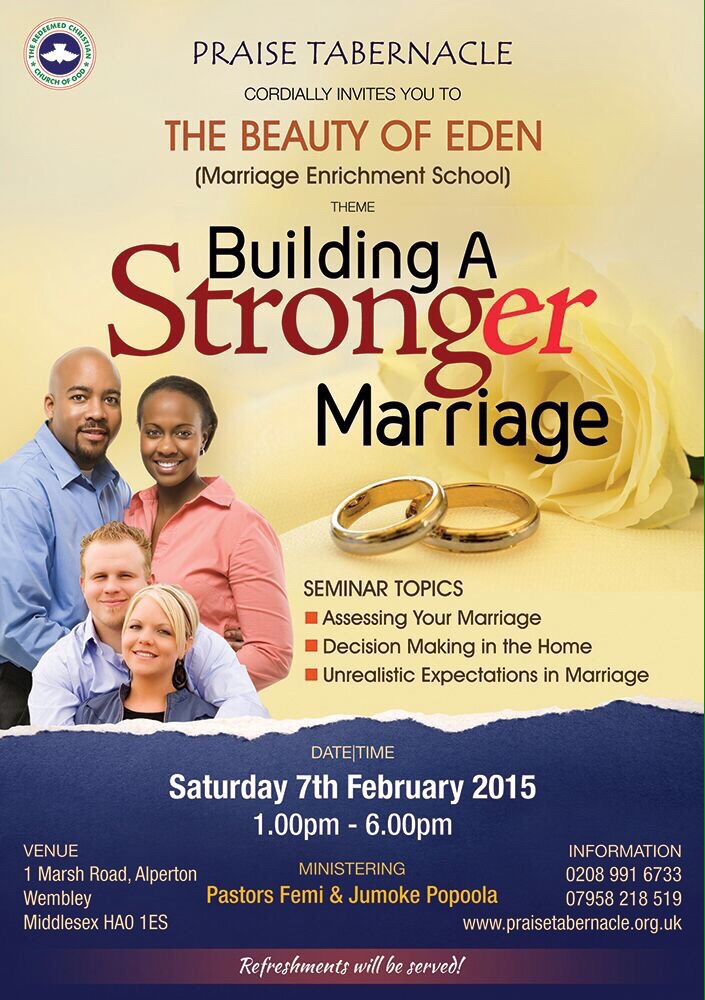
07 Feb Building Stronger Marriages

INTRODUCTION
In the Garden of Eden, God planted trees, flowers, shrubs, rivers, animals and man.
All these together, were very beautiful to the eye. The real beauty however was not to
be found in the trees, animals or even man. The true beauty of Eden was in the rela-
tionship God created when He brought man and woman together as man and wife,
making them ‘one flesh’ (Gen.2.24, Prov.18.22)
Marriage was created and instituted by God. (Gen.2.18-24). It was God’s idea, not
man’s.
The devil came in and perverted God’s institution and created another form of mar-
riage different entirely from God’s original plan. (Gen.3)
We therefore, see two marriages in the beginning. One in Genesis chapter 2 and the
other in Genesis chapter 3.
The later marriage in Gen.3 will eventually end in divorce, but we will focus our study
in the Marriage in Genesis 2
Since God instituted marriage, if we follow the instructions in Genesis chapter 2, (and
the instructions are many) we will have beautiful, fruitful, blessed and happy marriages
Even if your marriage (or someone’s you know) is in or almost at the divorce courts,
applying God’s principles will turn things around
We are looking at Building a Strong-er marriage, whilst looking at:
Assessing Your Marriage
Decision Making and
Unrealistic Expectations in Marriage
You are welcome
Femi and Jumoke Popoola
1.
ASSESSING YOUR MARRIAGE
We are starting by assessing our marriages. This will give an idea where we are in the
journey of marriage
As you take you assessment, you will be helped better if you are brutally honest with
yourself.
There is something that comes before a building, and that is the foundation. Before we
look at the Marriage Building that everyone sees, lets examine the Marriage Founda-
tion that is not so easily visible
2.
THE FOUNDATION OF A STRONG MARRIAGE
Psalm 127:1
Unless the LORD build the house, they labor in vain that build it, unless the
LORD guards the city, the watchman stays awake but in vain.
Luke 6:47-49
47. Whoever comes to Me, and hears My sayings and does them, I will show you
whom he is like:
48. He is like a man building a house, who dug deep and laid the foundation on
the rock. And when the flood arose, the stream beat vehemently against that
house, and could not shake it, for it was founded on the rock.
49. But he who heard and did nothing is like a man who built a house on the
earth without a foundation, against which the stream beat vehemently; and im-
mediately it fell. And the ruin of that house was great.
Foundational Ingredients Of A Strong Marriage
There are several non-negotiable essentials that stand as pillars in every strong, spir-
itual marriage. This passage shares them with us.
A.
Love
Paul describes the kind of love we are talking about in 1 Cor. 13:4-6
4. Love suffers long and is kind; love does not envy; love does not parade itself,
is not puffed up;
5. Does not behave rudely, does not seek its own, is not provoked, thinks no
evil
6. Does not rejoice in iniquity, but rejoices in the truth
A closer look of love’s ‘ingredients’ is in order here.
v. 4
Suffers long
(Patient endurance even when provoked, long-tempered)
Is Kind
(Active goodness, never hateful or mean, kindness in words and actions)
Does Not Envy
(True love is not jealous. Instead of being jealous when others prosper or excel, love is
pleased when they do well)
Love Does Not Parade Itself
(Does not make a parade, does not brag, does not draw attention to itself or to what it
is doing)
Is Not Puffed Up
(Love is not arrogant or proud. It does not demand to be number one)
v. 5
Does Not Behave Rudely
(Love is never rude, but it always treats others with compassion, consideration and
respect)
Does Not Seek Its Own
(Never selfish or self-centered, interested in what will profit others)
Is Not Easily Provoked
(Keeps no record of evils done, endures all slights and injuries, not irritable)
Thinks No Evil
(Genuine love does not attribute evil motives to people. Genuine love does not keep a
record of evils done to it)
v.6
Does Not Rejoice In Iniquity
(Love does not rejoice in sin)
Rejoices In The Truth
(Rejoices when truth is proclaimed and when truth wins the victory)
This kind of love needs to be mutual and not one-sided. The husband is commanded
to love his wife with every fiber of his being, (Eph. 5:25; 28, 31). The wife is command-
ed to love her husband. (Titus.2.4)
A home filled with love is a home filled with the essence of Heaven
B
Loyalty
Eph. 5:31 speaks of the law of “leaving and cleaving”. This was what God expected of
the first married couple and it is what He expects of every other married couple.
31.For this reason a man shall leave his father and mother and be joined to his
wife, and the two shall become one flesh.
When a man and woman are married, there is a fundamental shift in their relationships
to others.
Their relationship with the parents is altered forever. It can still be strong, but the mar-
riage relationship must have preeminence over the parental relationship.
This kind of loyalty is spelled out in 1 Cor. 13:7
7. Bears all things, believes all things, hopes all things, endures all things.
Look at the ingredients of true loyalty
Bears all things
(Loyal even when things are tough. It doesn’t walk out in the day of trouble)
Believes all things
(Loyalty trusts one’s spouse)
Hopes all things
(Loyalty never looks for the worst in them, but only believes the best)
Endures all things.
(Loyalty sticks it out. Loyalty does not abandon)
C
Respect
Mutual respect is fundamental for any marriage that expects long-term success. Let’s
examine a few scriptures that speak about this today
Eph. 5:22-24
22. Wives, submit to your own husbands, as to the Lord.
23. For the husband is head of the wife, as also Christ is head of the church; and
He is the Saviour of the body.
24. Therefore, just as the church is subject to Christ, so let the wives be to their
own husbands in everything.
God is not establishing the husband as some kind of dictator in the home. Nor is God
relegating the wife to a place of servitude. The word ‘submit ‘means ‘to arrange under’.
The husband is not to demand submission from the wife. She is to offer it freely and
lovingly.
God has invested leadership in the husband and he will be held responsible for the
home. He will give an account for his actions as the head of the home when he stands
before Jesus.
Eph. 5:28-29
28. So husbands ought to love their own wives as their own bodies; he who
loves his wife loves himself.
29. For no one ever hated his own flesh, but nourishes and cherishes it, just as
the Lord does the church.
The church willingly submits to the lordship of Jesus in its life because the Church
knows that Christ loves the Church. The Church understands that Christ gave Himself
to save it sacrificially, willingly, lovingly and unconditionally, therefore the Church re-
sponds to this love by submitting to Christ.
The same is true in the home. When the husband loves His wife sacrificially, willingly,
lovingly and unconditionally, she will respond by respecting him.
It is an automatic response
Verses 28-29 teach us that the husband is to love his life like he loves his own flesh.
Husbands are to ‘nourish’ and ‘cherish’ their wives.
Let’s consider these two words for a moment.
He Is To Nourish “To bring to maturity.”
(A godly husband helps his wife to reach her fullest potential in God. He helps her to
grow by meeting her needs and by being an encouragement to her life)
He Is To Cherish “To soften with heat.”
(Women need to feel loved and they crave special attention. They need time, atten-
tion, and a sense of security. A loving husband can easily provide all these things to
his wife)
D.
Faithfulness
Eph. 5:31
For this reason a man shall leave his father and mother and be joined to his
wife, and the two shall become one flesh.
It is never acceptable for a man or a woman to have a sexual or emotional relationship
with a member of the opposite sex on the side.
Adultery is a sin regardless of the form it takes. (Matt. 5:28)
Before we look at Decision Making and Unrealistic Expectations, we need to look at an
important topic that may prove foundational and help us navigate through these 2 top-
ics
3.
Do You Both Know Each Other’s Value and Ideal System?
(Matt.12.30, Matt.6.24)
It is important in your marriage that both of you are true to yourselves not only as indi-
viduals but also true to yourselves as a married couple.
Before you can do that you need to know what the two of you value.
There is a difference between values and ideals.
A value is something you recognize as good and worthwhile and that you choose to
have in your life now by being willing to sacrifice other things for it now.
An ideal is something you recognize as good that you want in your lives sometime in
the future, but you are not willing to sacrifice for it now.
Values and ideals are often confused, but the difference between the two is the level
of commitment and willingness to give something else up for it.
As an example, some couples say they value a good marriage, yet they do nothing to
make their marriage better. So in reality, for them, a good marriage is an ideal, not a
value.
For something to be a value, it must affect most if not all areas of your life e.g. your
Leisure time,
Work,
How you spend your time
How you spend your money,
Time spent with family and friends.
How to Recognize Your Values
The best way to recognize your own values is to analyze two very important aspects of
your life.
The first is Time:
· How do you spend your time?
· How much time do you make for one another?
How much time is spent on hobbies or recreation?
The second is Money:
· How do you spend your money?
Where does it go?
Prioritize Your Values and Ideals
Sometimes both of you may place a value on the same thing, but the value is different
in terms of priorities and importance.
Without the two of you talking about this, the differences can lead to conflict, confu-
sion, and disappointment.
In case where there is a difference in values, this couple will need to honestly appraise
whether adopting a particular value it is going to be good for their relationship or not.
Some questions to ask can be
· Will doing xyz bring us closer or allow us to grow apart?
· Will it make my spouse happy?
What will it cost me to prioritize his/her preference?
It will be a good idea for each of you to write down your top ten values and compare
them. Choose the ones that are on each of your lists and individually prioritize them
with the most important at the top of the lists.
Compare your lists and see if there are any values that both of you put towards the
top.
Continue to compare and discuss the top values until you are both in agreement as to
what your top three values are.
Remember that a value is an ideal if it does not affect your lifestyle.
4.
DECISION MAKING IN MARRIAGE
(Pr.11.14, Pr.15.22, Pr. 24.6)
Making decisions are inevitable in marriage. Some decisions have a short impact on
your life. Other decisions can have a more lasting impact.
Married couples need to talk about how to make decisions.
What are Important Decisions?
What is considered to be an important decision is one of the first decisions you should
make in your marriage.
Most couples consider the following decisions to be major decisions that require dis-
cussion and agreement.
· Where the two of you will live.
· How many children you will have.
· Household chores.
· Parenting styles.
· How you will spend and save money.
· In-laws
· Sex
· The amount of free time you will spend together.
· Decisions regarding a crisis.
· Future plans.
You may add to this list……….
Once this has been agreed then you need to discuss how the two of you will handle
making decisions together.
Mutual Decision Making
(Gen.2.18, Ecl.4.9, Nu.11.14, Pr.27.17)
As a married couple, you will make many decisions throughout your marriage. Make
sure that these decisions are mutual decisions.
For you to make mutually acceptable decisions, your value and ideal system must be
re-visited if it has not been done already.
Without this, decision-making WILL be problematic
First Things First
1. Making decisions should be a shared responsibility. For a marriage to be stronger
both parties must have equal responsibility in making decisions
(1Cor.12.20-21)
2. Sharing decisions means that neither spouse has to be “wrong” or “lose.” Both
share the results.
3. Both partners should be sincerely concerned about the wishes and personal prefer-
ences of the other. (1Cor.10.24)
4. They are both willing to go more than halfway in reaching mutually satisfying com-
promises.
5. Decisions or compromises that are made are made willingly instead of grudgingly
(1Cor.12.25)
Decision Making Process
1. Agree that a decision needs to be made (Amos.3.3)
2. Pray together and receive God’s wisdom and guidance as you make your decisions.
(Jer.29.11, Pr.3.5-6)
3. Gather facts and information. You can do this both individually and as a couple.
Seek information from experts. (Luke.14.31). Friends & family input needs to be done
with caution.
4. Create time to talk with one another about the decision. Share what you find with
each other. (Pr.25.8, Pr. 20.18)
5. Ask pertinent questions. Such as:
· Will taking this bring us closer or allow us to grow apart as a couple?
· Will this impact the children positively?
· What impact will this have on our spiritual lives?
What are the financial implications?
6. Don’t focus on only one option. Look at several options that may be available to you.
Be ready to submit to one another. (Eph.5.21)
7. Talk with one another about and weigh the pros and cons of the decision you are
about to make. Pray together again and ask for guidance
8. Make sure the decision is such that you can both live with. You must both accept
and take responsibility for the decision.
9. Don’t play the blame game later if the consequences of the decision are negative.
10. Make a commitment to revisit the decision you made at a later time and to re-
evaluate it.
5.
UNREALISTIC EXPECTATIONS
There are things you can both do and believe that will end up being direct paths to dis-
appointment and unhappiness in your marriage. These include having
· False expectations,
· Thinking that someone else can make you happy
· Trying to read one another’s mind
· Wanting to do everything together
· Wanting to have a perfect or ‘Hollywood’ marriage
· Marriage must always be exciting (No boredom)
· Marriage cannot be lonely
· Sex every time
Identify Your Expectations
It is very important to be able to identify and actually talk about expectations with one
another. Together you can fine-tune your expectations so that neither of you is trying
to live up to something that is impossible.
Achievable Expectations Are Okay
It’s okay to have expectations. Everyone does. However, the expectations need to be
realistic & achievable, or else the sense of disappointment, disillusionment and des-
pair from failed expectations will bring spouses to the point of wanting to call it quits.
Positive Expectations
Hopefully, your expectations will include being able to lovingly resolve conflicts, to ap-
preciate your differences as individuals, to respect and cherish one another, and to be
able to discuss values and priorities.





No Comments